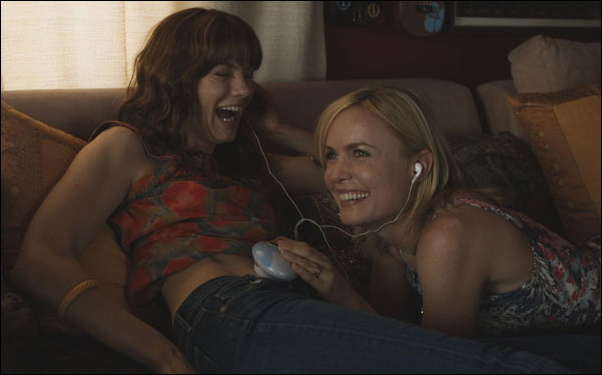It’s usually inconsequential to note when I see a film, but as a Saturday afternoon matinee at this year’s SXSW Film Festival, “Gus” is about as ideal a film as you’re likely to find.
Set in sunny Southern California, it’s a little comedic, a little dramatic and altogether satisfying in telling the tale of two best friends whose lives get complicated after one gets pregnant and offers the other her baby-to-be. While that may sound like the premise for a Lifetime movie and the nondescript title doesn’t help, writer/director Jessie McCormack’s feature debut is considerably more well-tailored, though no less lighthearted, casting two actresses in Michelle Monaghan and Radha Mitchell who rarely get to show their funnier side, but form a wonderfully odd couple here.
More so than the possibility of the baby changing hands, their chemistry actually provides “Gus” with its central conflict, as Monaghan’s Andie, a foul-mouthed free-spirit who lives for the moment, finds her way into the one area of her friend’s life that’s been off-limits for the lifelong pals when her offer to help Lizzie (Mitchell), after years of struggling to conceive with her husband Peter (Jon Dore), thrusts her physically and psychologically into the couple’s private life when she moves into their house. While the prospect of a child together creates a deeper bond between Lizzie and Andie, it leaves Peter as the odd man out, giving him plenty of time to dwell on the fact that he might not be up to the responsibilities of fatherhood since commissions are drying up in his day job as a realtor and his brother Casey (Michael Weston) isn’t too keen on receiving his help, even though he just left rehab.
McCormack encounters mild trouble in handling the film’s tone as a director, establishing a straightforward style to match the screenplay’s simple, effective observations of relationships but isn’t afraid to shake things up. She hits paydirt when the film gets a periodical boot in the ass from Peter and Lizzie’s unmerciful shrink, played with scene-stealing aplomb by Mimi Kennedy, but must also live with the consequences when, say, the grossout humor that accompanies Casey’s storyline mines laughs at the expense of the comfortable vibe she invests so much in setting up.
Mitchell’s Lizzie is actually built for the abrupt shifts, an even-keeled, nonconfrontational creature of domesticity who has been holding in her fears and anxiety over her inability to conceive for far too long. Given Mitchell’s porcelain features, it’s particularly amusing when she breaks and in tandem with Monaghan, who is clearly having a ball as Andie, who welcomes everything that comes her way, “Gus” more or less can coast on goodwill alone.
There’s a lot to be said for such an effortlessly graceful pairing when so little is usually said about such strong female friendships on the big screen. So often accepted rather than developed in depth, the notion that women with different desires and interests could ever be friends unless they’re polar extremes is almost radical, with most usually retreating to place them in the more dramatically inert position of reducing them to their singular wants and needs. “Gus” goes for something so ephemeral and rarely tackled onscreen that despite its trappings as a genial comedy, it’s as rebellious as what Andie disparagingly refers to as “the beast inside my belly.” Like the kid, “Gus” has real kick.
“Gus” does not yet have U.S. distribution.




